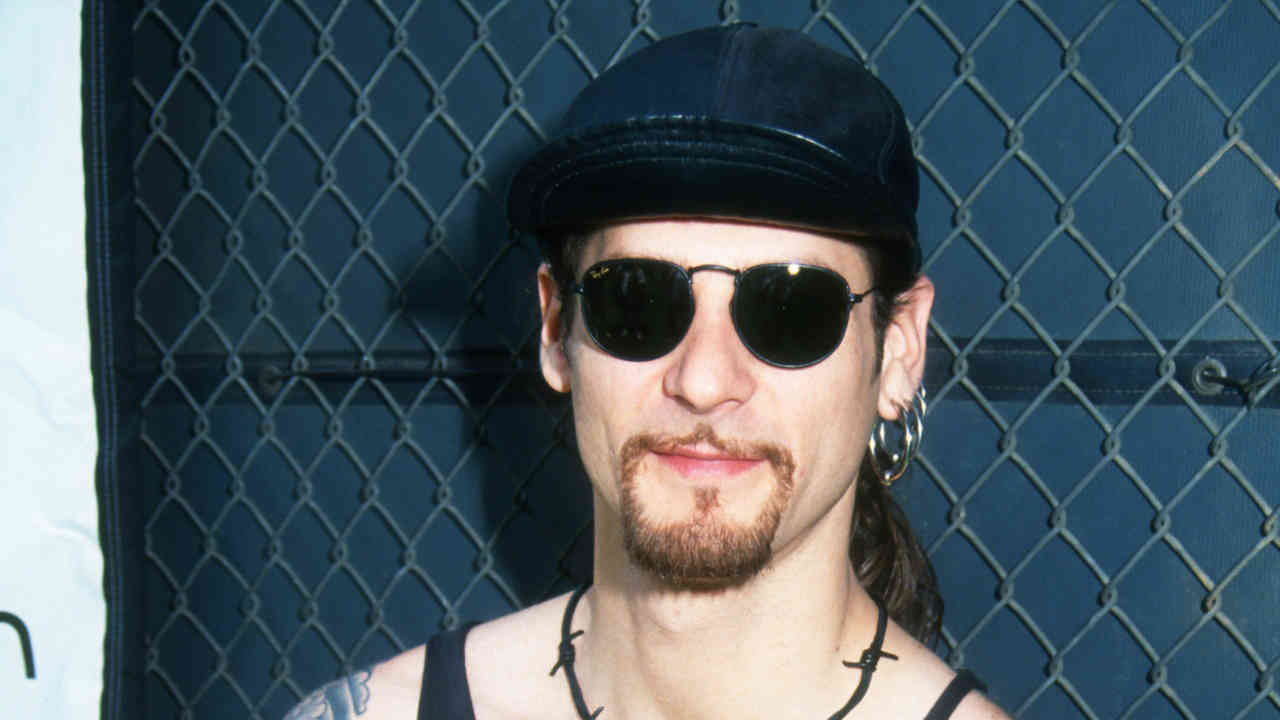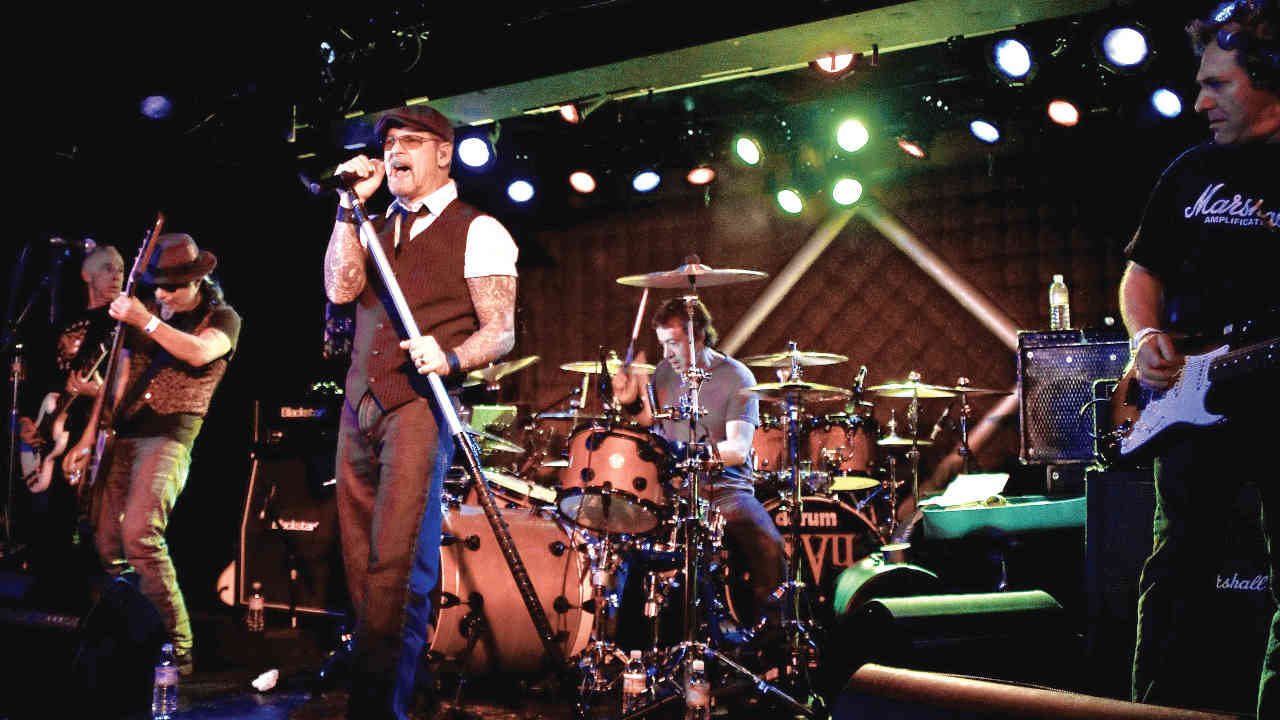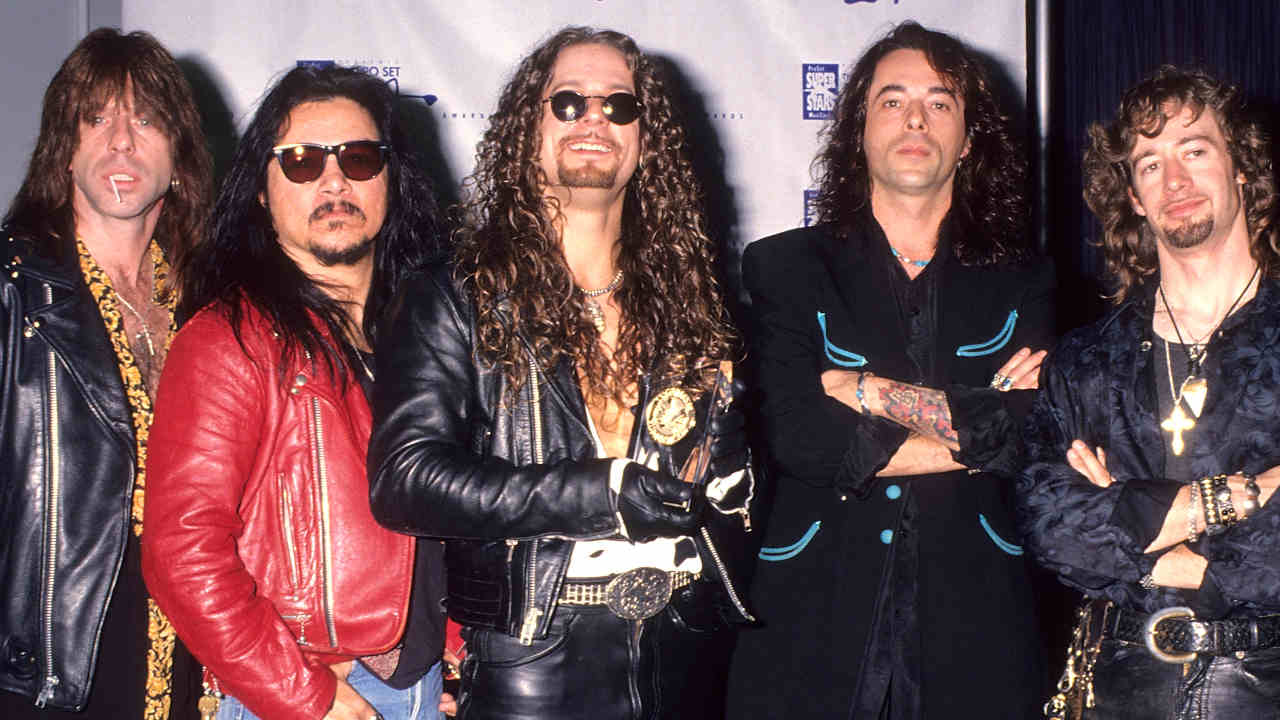Ron Young has learned three valuable lessons from 35-odd years clambering over the foothills of the music business. One: no matter who you have in your corner, you’re always just one tiny cog in someone else’s vast and unforgiving machine. Two: if things do go belly up, it’s advisable not to turn to heroin to deal with it all. And three: whoever said that there were no second acts in American life knew jack shit about rock’n’roll.
Young’s band, Little Caesar, were one of the more convincing Great White Hopes to emerge from the neon circus that was the late 80s LA scene. They arrived in a blaze of hooplah, swaggering out of the biker bars of East Hollywood clutching AC/DC’s Powerage under one tattooed arm and Otis Redding’s Otis Blue under the other. Their self-titled debut album was a minor classic: a gritty, soul-infused take on American rock’n’roll whose bluff exterior hid a tender heart. In the charismatic Young they had one of the great singers of the era, a gravel-throated powerhouse who slipped between euphoria and heartbreak like a 60s soulman sliding across the stage. They had everything a band could want: major label deal, superstar A&R man, big-hitting management, all the right connections… and they had the songs.
And yet within three years Little Caesar were flat on the canvas, failed contenders left battered and bruised by the very people who were supposed to be on their side. The question isn’t ‘What went wrong?’ so much as ‘What didn’t?’ It’s an old, old story, but Little Caesar were lifted higher and crashed harder than most.
“We lumped ourselves in with a bunch of guys who were all about power and pettiness and flexing their dicks,” says Young now. “Those were the guys that killed the music business. They let the accountants take over, and that killed something sacred.”
But here’s the twist. Years after they were left for dead, Little Caesar picked themselves up, dusted themselves down and started over again. Only this time, it’s on their own terms. Their cautionary tale has turned into a salutary lesson in how to survive the music business.

Ron Young looks looks back on his band’s early years with equal parts pride and frustration. He’s a great talker, smart and honest with a machine-gun delivery punctuated by a mix of laughter and exasperated sighs, depending on who or what he’s talking about. We speak for 90 minutes, and it feels like he could carry on for another 90 without pausing to piss. For a man whose band failed in the most painful way, he sounds incredibly chipper.
He’s an east coast native originally, and there’s an earthiness that’s not indigenous to California. But that’s where he ended up in the mid-80s, after spending years kicking around in bar bands back in New York and getting inked. He took jobs as a bike messenger, a bouncer and a DJ in rock clubs while singing with assorted bands. One of these was the Red Hot Chili Peppers, who he briefly joined when Anthony Kiedis was temporarily kicked out due to his drug abuse – a good experience for Young, but ultimately a bad fit for them.
When Little Caesar came together in 1988, their earthy rock’n’roll was out of step with everything that was going on the city. The Sunset Strip glam metal party was in full swing just a few miles down the road, but it might as well have been happening in another galaxy.
“There were all these bands with the hair and the make-up and everything else,” he says with a snort. “It was scaring the crap out of me, cos I didn’t want to look or sound like those guys.”
Instead, they made their turf in the seedy dives of East Hollywood, where junkies bumped elbows with bikers and hogs were lined up down the street. Young rode a bike himself, though for him two wheels was a lifestyle rather than a pose. “Didn’t even own a car,” he says proudly. “I drove a Harley.”
Their live shows became legendary around LA (one early champion was former Guns N’ Roses manager Alan Niven). But Little Caesar weren’t stupid – they’d put the band together to get a deal and become famous. And after a slow start, things began to snowball. Within a year, they’d signed to Geffen Records offshoot DGC and got a music industry dream team behind them: big-hitting manager Jimmy Iovine, superstar A&R man John Kalodner, and, in music mogul David Geffen, the ultimate label boss. Young should have been doing cartwheels of joy in the street. Instead, it made him nervous as hell. “It was a real Hollywood thing, so big so fast,” he says. “Too fast.”
There were teething problems – the label pulled live shows against the band’s wishes to “preserve mystique” and announced that they would release an EP on a pseudo-independent label to create some street-level buzz. (Young: “They said it had worked for Guns N’ Roses. We were, like, ‘Oh man, that’s really contrived…”). But it was when the label insisted they recorded their debut album with producer-of-the-moment Bob Rock that the alarm bells started ringing.
“We wanted to work with someone like [Rolling Stones producer] Tom Dowd,” says Young. “Bob Rock was the furthest from our minds. But he slides down from Vancouver, sees the band and goes, ‘Hey, we can make this work’. And then Bob falls out with John Kalodner and everything is delayed for a year.”
The album was finally recorded and released in 1990. Young was unhappy with the way it sounded – too glossy, too many overdubs, nowhere near raw enough. “It wasn’t us,” he says simply, admitting his honesty didn’t go down well with his corporate paymasters.
He’s wrong – a misfiring cover of Aretha’s Franklin’s Chain Of Fools aside, its balance of hard rock muscle and soul power was spot-on, not least on the killer ballad From The Start and another cover, a terrific take on 60s soul staple I Wish It Would Rain. It sold 200,000 in its first few weeks, and MTV and radio both picked up on the band.
But misgivings about the sound would soon be the least of his worries. Within a month of the album’s release, David Geffen announced that he was selling his label. What followed belongs in the pages of the business papers, not a music magazine: an army of faceless accountants were parachuted in to tart up the label with a view to pimping it to the highest bidder. Costs were slashed, tour support was pulled, records were shelved, label staff were fired, momentum was killed. David Geffen walked away with two billion dollars. For Little Caesar – more than a million dollars in the hole and with a potentially massive debut album now dead in the water – it was disastrous. The label blamed the band’s image for their lack of success – too rough’n’ready. The band blamed the label for being corporate idiots.
Young decided to kick back. “Here I am, the rude, crude, asshole biker singer telling John Kalodner that this new band he’s got, Blue Murder, sucks,” he says. “They just looked at me, like, ‘How dare you say that’.”
They were on a turbulent tour with Kiss when the penny dropped. “I thought, ‘Dude, we are fucked’,” says Young. “Everyone was jumping like rats off a sinking ship, there were all these huge egos involved, and nobody wanted the stench of us on their hands.”
Little Caesar were victims of the perfect shitstorm of clashing egos, business decisions, horrendous timing and changing cultural tastes. They made a second album, 1992’s Influence, with former David Bowie sideman Earl Slick on guitar, but the moment had gone. Geffen could have let them go to another label, but if they’d succeeded, then the label would have been left looking like fools.
It’s got be asked, but were the problems really all down to the label? Could the band have been at least partly to blame?
“I’m a big boy, and yeah, of course there was a problem with the band,” he says. “The problem was that the more they pushed us to conform, the more rebellious I got. That’s a really immature way of doing things. But you sell your soul to a corporation, they own you. You carry no weight for them. You’re swimming with fucking sharks, dude, and you don’t got enough teeth to bite back.”
Little Caesar took the hint and split in 1993. It was right around that time that Young decided to devote his energies to taking heroin.
During the band’s ascent, he says, he was as responsible as a rock’n’roll singer could be: he never even drank before shows. But he’d begun dabbling with drugs around the time of the band’s second record. By the time it all came down around their ears, he’d upgraded to a full-blown smack habit.
“It kept the edge off things, shut out all these feelings, all the shit I was dealing with,” he says. “I’d been through a traumatic event, and I had no coping skills to deal with it. I crawled into a bad old habit. It was mostly out of self pity and frustration and complete helplessness.”
Looking back, he describes himself as a “functioning addict.” His habit might not have been fatal but it was bad enough to wreck his marriage and generally fuck up his life. Professionally, he kept things ticking over. In 1994, he came within a top hat’s width of becoming the singer for Slash’s GN’R side-project Slash’s Snakepit, only for it to fall through when his record label – Geffen, ironically enough – insisted the guitarist go for something that was closer Guns N’ Roses.
“I was kind of relieved,” he says now, “cos I didn’t want to do something else and have it fail.” There was Manic Eden, a dark, bluesy collaboration with former Whitesnake guitarist Adrian Vandenberg that lasted all of one album, and a fleeting stint with cult boogie rockers The Four Horsemen.
But mostly, he spent the time sinking further and further into his addiction. He struggled to keep afloat, financially and spiritually. “I was on heroin, I had no job, no home, I’d torched my marriage,” he says. “I was literally homeless and penniless.”
It wasn’t until the end of the 90s that Young hit bottom and realised it was time to sort out his lifestyle before it killed him. With the help of charity foundation the Musician’s Assistance Programme, he entered rehab and successfully kicked his addiction. Post-rehab, Young earned good money working as production manager at now-closed Sunset Strip hangout The Key Club.

“I’d see bands we’d played with back in the day at the club,” he says. “They’d look at me all sincere and go, [mock sincere] ‘Dude, hang in there, you’re a great singer’. I’m like, ‘Whoa, you feel sorry for me? Wait a minute, I’ve got a great job, I own a home, I don’t have to wear a hairpiece and sing Up All Night And Sleep All Day then get in a van and drive to a motel’.”
But there was a itch that needed scratching. After the fog lifted, he’d gained some clarity on his situation. Little Caesar might have been fucked every which way by the music business, but there was still a flicker of life there. They might not have become famous, but they were important in their own way – to the singer, to his bandmates, to the people who followed them back in the day.
He’d stayed in touch with his former colleagues through the tough times – guitarist Loren Molinare had picked him up and driven him home from rehab – and it was only a matter of time before they started playing together. Casual jamming led to a few local shows. Young admits to reservations: old school rock’n’roll was viewed like a relic from another age in Los Angeles in the early noughties, and by his own admission, the band were hardly spring chickens. And then there was all the bullshit that landed him in trouble in the first place. Ask him how hard it was to go back to it, and he laughs.
“I was scared that I was gonna open up a box of pain and drama. You start making music, you get excited, you start to want to play, you want people to hear you music, you need a distributor, you need a deal, you need a video.” He sighs. “All the crap that just kills you.”
Since getting back together, they’ve released three albums that picked up where they left off – 2009’s aptly-titled Redemption 2015’s American Dream and 2018‘s Eight. They still play from time to time – their most recent run of shows was in Spring 2023.
There’s no big corporate beast breathing down their necks – Young himself effectively funded their recent albums. But neither are there any huge expectations – hell, if they couldn’t make it with millions of dollars behind them all those years ago, they’re not going to make it now. These days the rewards are less, but so is the pain, stress and the bullshit.
“Man, I want some balance in my life,” says Young with a laugh. “Maybe I’d have done things differently back in the day – maybe I wouldn’t have pushed back in such an immature way, Maybe it wouldn’t have made a damn bit of difference if I hadn’t. But back then, it was always about the destination and never about the journey. Now it’s all about the journey.”
Originally published in Classic Rock #178

